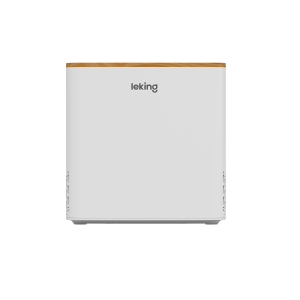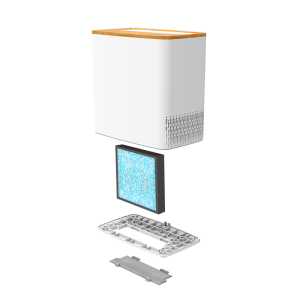In today’s world, air quality has become a growing concern due to pollution, allergens, and indoor toxins. While we focus on the environment outside, many people overlook the importance of maintaining clean air inside their homes. Investing in an air purifier can significantly improve your indoor air quality and provide a variety of health benefits.
This article will explore why you need an air purifier, how it improves air quality, and how it contributes to your overall health and well-being. If you’re wondering whether an air purifier is worth the investment, read on to discover how it can make a noticeable difference in your life.

What Is an Air Purifier?
An air purifier is a device designed to remove contaminants from the air. It works by using different types of filters—such as HEPA filters, activated carbon filters, or UV filters—to capture particles and pollutants from the air. Whether it’s dust, pet dander, pollen, smoke, or harmful chemicals, air purifiers can clean the air and make breathing safer.
The Health Benefits of Using an Air Purifier
Air purifiers offer numerous health benefits, especially for individuals with respiratory issues or allergies. Here are some of the key health advantages:
1. Improved Air Quality and Breathing
One of the most significant benefits of using an air purifier is improved air quality. Clean air is essential for maintaining healthy lungs and a healthy respiratory system. Many indoor pollutants, such as dust, pet dander, and mold spores, can aggravate respiratory conditions like asthma, bronchitis, and allergies.
By removing these harmful particles, an air purifier can provide cleaner, fresher air that is easier to breathe. For individuals living in areas with high pollution or for those who spend a lot of time indoors, air purifiers can dramatically improve overall air quality.
2. Reducing Allergies and Asthma Symptoms
Allergies and asthma are often triggered by airborne allergens like pollen, dust mites, mold, and pet dander. For those who suffer from these conditions, an air purifier can act as a powerful ally. HEPA filters, which are standard in most air purifiers, are designed to capture tiny particles as small as 0.3 microns, including the most common allergens.
Studies have shown that air purifiers can reduce allergy symptoms by up to 60%, helping sufferers breathe easier and experience fewer flare-ups. If you have asthma, using an air purifier can also reduce the need for medication and inhalers, providing relief from symptoms like wheezing, coughing, and shortness of breath.
3. Prevention of Respiratory Problems
Long-term exposure to poor air quality can result in chronic respiratory issues. Airborne pollutants, such as volatile organic compounds (VOCs), formaldehyde, and benzene, are known to irritate the lungs and may lead to serious respiratory conditions over time. These harmful chemicals are commonly found in household cleaning products, furniture, and building materials.
Using an air purifier can help remove these pollutants from the air, preventing long-term respiratory problems and minimizing the risk of developing conditions like chronic obstructive pulmonary disease (COPD) or other lung diseases.
4. Eliminating Unpleasant Odors and Harmful Chemicals
Air purifiers with activated carbon filters are highly effective at removing odors and harmful chemicals from indoor air. Whether it’s cooking odors, cigarette smoke, pet smells, or household cleaning fumes, an air purifier can trap and neutralize these odors, leaving your home smelling fresh.
Additionally, activated carbon filters are excellent at absorbing chemicals like formaldehyde and benzene, which are often found in furniture, paints, and air fresheners. By removing these pollutants, air purifiers contribute to a healthier and more pleasant living environment.
5. Better Sleep Quality
Quality sleep is essential for good health, but environmental factors like allergens and air pollutants can interfere with restful sleep. Breathing in pollutants while you sleep can cause irritation in your airways, leading to poor sleep quality, snoring, and even nightmares.
An air purifier can help reduce allergens and irritants in the air, allowing you to breathe easier and sleep more soundly. Cleaner air also helps to lower the chances of waking up with a stuffy nose or sore throat. For people with sleep apnea or other sleep disorders, an air purifier may offer additional support for improved sleep quality.
6. Protection from Bacteria and Viruses
With the rise of respiratory infections and airborne diseases, protecting your home from bacteria and viruses has become more critical than ever. Air purifiers equipped with HEPA filters and UV-C technology can trap airborne pathogens like bacteria and viruses, reducing the likelihood of illness.
Some studies have shown that air purifiers can help eliminate up to 99.97% of airborne viruses and bacteria, offering extra protection for children, the elderly, and those with compromised immune systems.
7. Enhanced Cognitive Function and Focus
Clean air not only benefits your lungs but can also improve your brain function. Studies have found that poor air quality can lead to decreased cognitive performance, including issues with concentration, memory, and mental clarity.
An air purifier that removes dust and other pollutants can help improve focus, reduce mental fatigue, and boost productivity, especially in work or study environments. By ensuring that the air you breathe is free from irritants, you can perform better at school, work, or any activity that requires concentration.
8. Ideal for Homes with Pets
Pets bring joy to many households, but they also contribute to indoor air pollution. Pet dander, hair, and saliva can trigger allergies and asthma symptoms, and their odors can be difficult to eliminate. Air purifiers, especially those with HEPA filters, are highly effective at trapping pet dander and hair particles, improving air quality in homes with pets.
Additionally, air purifiers can help remove pet odors, ensuring your home remains fresh and clean, even with furry friends around.
9. Energy-Efficient and Cost-Effective
Modern air purifiers are designed to be energy-efficient, meaning they use minimal power to deliver maximum results. Many models come with energy-saving features like automatic shut-off and smart sensors, so you can enjoy clean air without significantly increasing your electricity bill.
Moreover, by reducing the need for medications and treatments related to allergies or asthma, air purifiers can save you money in the long run. They can also prolong the lifespan of your furniture and carpets by removing dust and dirt from the air.
How to Choose the Right Air Purifier for Your Home
When choosing an air purifier, consider the following factors:
- Room Size: Ensure the air purifier is rated for the size of your room. A larger room will need a more powerful unit.
- Filter Type: HEPA filters are essential for capturing small particles, while activated carbon filters help with odors and chemicals.
- Noise Level: If you plan to use the air purifier in a bedroom or quiet space, check the noise level.
- Additional Features: Features like air quality sensors, smart controls, and filter replacement indicators can make the unit more convenient to use.
Investing in an air purifier can significantly improve your home’s air quality and provide numerous health benefits. From reducing allergies and asthma symptoms to improving sleep quality and cognitive function, the advantages of clean indoor air are clear. Whether you suffer from respiratory conditions, have pets, or just want a fresher, healthier living environment, an air purifier can make a real difference.
If you want to get a high-quality air purifier, you might as well try leking. As a professional manufacturer, leking has professional production models and partners, and can provide you with high-quality products and excellent services!
Explore our top recommendations for the best air purifiers to find the perfect model for your home and start experiencing the health benefits today.



